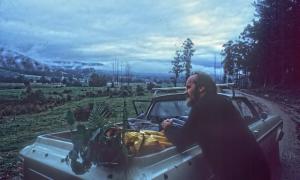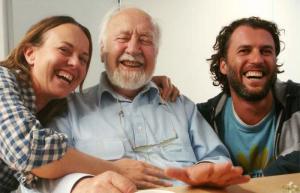The Northern School of Permaculture
You are here
Burnout
a potential fate of committed people ... By Bill Mollison
 Burnout is a state or deep fatigue. depression and despair that follows on too-intensive and long-protracted periods of work in many areas of long-term problems: it is most likely where volunteers work in areas of human suffering and misery. such as are found in slum areas and tribal reserves, or in war.
Burnout is a state or deep fatigue. depression and despair that follows on too-intensive and long-protracted periods of work in many areas of long-term problems: it is most likely where volunteers work in areas of human suffering and misery. such as are found in slum areas and tribal reserves, or in war.
Symptoms range from (in the extreme) suicidal impulse. or inability to make decisions, withdrawal into isolation, savage or antisocial behaviour or extreme risk-taking. Minor symptoms are alcoholism, heavy smoking, drug-taking, sudden tearful episodes, and an erosion of the sense of self-preservation.
Similar syndromes are those of 'survivor-guilt' following catastrophes where family. friends. or neighbours are killed or injured, and the psychoses of war. Particularly prone are those who are involved - in the 'front line' - of aid programmes. medical rescue missions, or catastrophe relief. But long-maintained aid to distressed people (or distressed environments) eventually evokes the syndrome.
Exacerbating factors are those of facing successions of anxious, shocked, dying or helpless people (and being unable to help all or even very many of them); constant demands and way few 'gifts' of attention to oneself eventually leads to an aversion to facing people, who may come in the end to mean 'trouble", or certainly not comfort, unless they are themselves in good heart.
Commitment often means a solitary or socially-deprived life, much of it spent in remote areas, among foreign cultures, and very often in problem ares, with a low cash resource base. There is seldom enough money or resources in problem areas, and the almost everyday surreal juxtaposition of the greedy, affluent and consumptive wealthy with eroded lands and hungry people is even more depressing. The looted artifacts of aging cultures and the rapacious exploitation of poor people are everywhere around one with the value-free socialites in “the west', where even the 'new age' preach wealth consciousness, not frugality consciousness, and thus oppress the earth Itself, and it's peoples.
Burnout needs Io be avoided by long rest periods every 4-l8 months, and a recharge of optimism from friends, lovers and unspoilt nature or wilderness. Even so, once subject to burnout, it is harder to get up the morale to “go back in'; hence the concept of 'tours of duty' in wars, limited to a few missions.
Several of us in Permaculture have various stages of this depressing psychosis, often compounded by illness or malnutrition while on fieldwork, by personal debt, or broken relationships often brought about by the work itself. I write this short account to warn others of the possibility that they may one day suffer if they return too frequently to areas of human need; and to stress the great need for many more of us, not only to share the load - "fresh troops" - but to care for those who are heavily involved - to form back-up or support services for those on the line. It is as hard to pull out of tough work as it is to go in, and those people who care are easily over-exploited; only when enough of us are recruited to equally share the stress, and to raise the morale of others are we likely to both come closer to solving problems and to survive with lesser damage, so that our first survival priority is to recruit others - and especially to train others in the areas of need, or to get good back-up teams in the field.
 Curiously, the stress caused by insatiable questions and challenges is a feature of the "new age" west. Traditional societies protect, care for, and rest their teachers. We exploit them, call on them for help, when they are most in need. Our true friends smooth our path, prepare places for us to rest a while, and comfort us in our stress. We all of us have a few precious friends, often themselves "burnout cases".
Curiously, the stress caused by insatiable questions and challenges is a feature of the "new age" west. Traditional societies protect, care for, and rest their teachers. We exploit them, call on them for help, when they are most in need. Our true friends smooth our path, prepare places for us to rest a while, and comfort us in our stress. We all of us have a few precious friends, often themselves "burnout cases".
Think about this, and be alert if you are to be effective; at present we are a stressed group of guerrillas rather than a large enough force to rest its numbers. Train others.
My love to my fellow warriors, men and women of good heart.
(Transcribed from a copy of an unknown magazine article, circa 1988. View original article.)
Theme by Danetsoft and Danang Probo Sayekti inspired by Maksimer
